- Home
- Roxane Gay
Difficult Women Page 20
Difficult Women Read online
Page 20
Parker laughed. “Our boy fit in my hand when we brought him home. I couldn’t believe we made him. I do miss him, too, Anna. I miss him more than I can say.”
Anna crossed her legs and turned to look at her husband. “We made him and it’s time to be with him. You, me, Seven, we don’t make sense without each other. Spending the rest of this life without him … that would make me small. You have to choose.”
There was a loud ringing from somewhere, he wasn’t quite sure where. Parker rubbed his chin, the stubble making a raspy sound beneath his fingers. “I love the way the people talk down in Florida. I miss that. I miss the sun.”
Their wedding had been held on his father’s land, a big affair, everyone dressed in finery, lots of food, lots of drink. They even danced. For one night there was no austerity. Beneath a canopy of tiny white lights, the world felt like it once was. The General toasted the young couple, even toasted his own wife and their many solid years together, which was as demonstrative as he was ever going to get. Parker’s mother blushed beneath her husband’s attention and for the rest of the night her laughter filled the air as if it were her own wedding.
The newlyweds went to Florida for their honeymoon, Miami. It was hot, which Anna loved. Lots of people spoke Spanish, which Anna loved because she did, too. Parker felt lost but Anna was always there, showing him how little he knew of the world without making him feel lesser for it. They sat by a glittering ocean of blue water during the day, Anna in a tiny bathing suit revealing a lot of skin, Parker in board shorts and a bare chest. Enjoying the heat was decadent and they were decadent and there was no regretting it. They ran in the sand and dived into the surf. They drank rum, lots of rum, and ate rum-soaked fruit and spicy food. At night they danced to music Parker could barely remember from before the war. He loved it, how the bass thrummed in his chest, how he and his wife sweated together and moved together. Back in their hotel room, after the third night of dancing, Parker lay with his head against the flat of Anna’s stomach as she massaged his scalp. She said, “We could stay here, you know. We could never leave.” Years later, Parker realized he should have said yes, but that night, in the middle of so much happiness, he kissed the palm of his wife’s hand; he said nothing.
In the study, in the quiet of their nearly empty home and so far from the joy they once shared, Parker reached for his wife and pulled her to the floor. She resisted at first, slapped his hands away, twisting her body beyond his reach, but he said, “Don’t refuse me,” and she stilled. Anna gently held Parker’s face between her hands, rubbing her thumbs along his cheekbones. “I could say the same to you,” she said. He undressed her slowly, pulling at each exposed instance of her skin with his teeth, making a claim, leaving a mark. Anna was punishing as she rose to meet her husband, their hip bones crashing together. They wanted to hurt each other as much as they loved each other. That’s what they needed and demanded from each other.
Later, they sat on the porch swing, wrapped in blankets, drinking whiskey from canning jars. The night was cold and clear, the moon high, the street empty, their bodies tender.
Parker took a slow sip, the whiskey burning his throat. “I never thought it would come to this. I never thought it would go this long.”
Anna leaned into Parker’s shoulder and closed her eyes. “Pride does things to time,” she said. “And foolish pride is worse yet.”
“Am I a foolish proud man?”
Anna pulled away. “We will not fall asleep tonight listening to the breathing of our son. You are not a foolish man but you are proud.”
Parker reached for his wife’s hand and Anna let him show her this small affection. He traced her knuckles in slow circles. “When I was a boy, my father, I didn’t understand that man but he was always there, standing so tall over my brothers and me, putting the fear of God in us. He always told us, ‘A man stays close to home, close to his blood because that’s where he’s at his best.’”
A cold gust swept through the porch, the swing rocking lightly. Anna moved back into Parker’s arms. “I’m not saying your father is wrong but I’m not saying he’s right and if what your father says is true, we have to consider our blood, our son, my blood, our family.”
“When I first saw you—”
“Don’t,” Anna said, sharply, pressing two fingers against Parker’s lips. “Memories aren’t going to do us any good. We are here, now.”
Parker grunted, took another sip of whiskey. Anna did, too, and they continued sitting, silent.
The next morning, Parker woke up before the sun rose, put on his running clothes, and jogged to his parents’ home. He was a sweaty mess as he stood in the foyer, his hair clinging damply to his forehead, his neckline. The General hated it when anyone was unkempt and Parker hated his familiarity with everything the General hated. He found his father in the kitchen, sitting at the table with a cup of weak coffee, staring into the distance. The General looked up as his youngest son entered the room.
“I cannot say much for your attire, but at least you’re staying in shape. Military discipline has its benefits, wouldn’t you say?”
There was a small pool of coffee in the bottom of the carafe on the counter, and Parker poured it into a mug before sitting across from his father. “We need to talk, Daddy.”
The General looked up, his features as hard as they ever were. War does things to a man, they said, and many wars do many things to a man. The General was a man to whom many things had been done during tours in Iraq, Afghanistan, Iran, and even here in this land he called home. It was terrible, having to spill blood in the land that held your roots, but there was no choice when the alternative was spilling no blood and surrendering the land to those who could not respect history and place, legacy. This is what the General told himself now that the war was over and little had changed.
“I’m not interested in any conversation you want to have at this time of the day, skulking over here in the dark.”
“I’m not skulking,” Parker said, evenly. “Anna—”
The General pounded his fist on the table, sending the lid off the sugar jar followed by a thin trail of sugar Parker began tracing, enjoying the grit beneath his fingers. “Don’t you come to me with that woman’s name the first thing out of your mouth. Speak for yourself. She can certainly speak for herself.”
“We cannot stay. I am a son but I am also a father and a year apart from my boy is a year too long.”
“Bring the boy back. He belongs here, with us. This land here, this is his land. His history is in this dirt.”
“I won’t have my boy spending the rest of his life in this, living a lie I don’t believe in.”
“Our family has been defending and working this land since before we had a name for it. You do not walk away from that. I did not give you my name so you could run away with it.”
Parker ran his fingers through his hair and stood. “I am not running away.”
The General shrugged, then turned away. “I’m not sure what you want me to say.”
Parker approached his father slowly, squeezed the older man’s shoulder. “I don’t want you to say anything. I am just telling you where things stand.”
The General grunted and the men stood, together, in silence for quite a long time.
As he ran home, Parker kept repeating, “I am not running away.” He said it until the inside of his mouth was dry and his teeth were dry and it hurt to say the words.
Each morning when Anna awoke, she remembered the day she and Parker sent their son away. She remembered setting out his clothes—a button-down shirt, white with narrow gray stripes, and a worn pair of jeans she had recently mended. She remembered packing the last of his suitcases, trying to put some necessary part of herself alongside the clothes and books, an old action figure, a map of this new world because the boy loved maps, understanding the geography of things. Seven had not wanted to leave but his sorrow was dignified in the way of a child who understood the complexity of what his parents were deciding f
or him. They stood on the train platform, Parker gripping Seven’s shoulder so firmly the boy winced, but remained quiet.
Anna kept brushing Seven’s hair out of his face, adjusting the collar of his shirt. She tucked his passport into his shirt pocket and put his coat around his shoulders. She kissed his forehead and told him, “You be good for your grandparents. Don’t you forget us. Don’t forget me.” And then she went to the car to wait, telling Parker, “I’ll leave this to you now.” He was never sure if it was a punishment or a blessing because alone with his son as the train tracks hummed with electricity, he cried and hugged his son and inhaled deeply, trying to breathe in the smell of the boy. Parker watched as the train pulled away, Seven staring out the small window at his father, his hand pressed against the glass. Long after the train had departed, Parker stayed on the platform, his legs locked stiffly. He didn’t know how to stop crying, didn’t want his woman to see how broken down he was. She did, eventually, because she came and found him. She said, “My poor, poor love.” She wrapped her arms around him beneath his coat. She said, “This had to be done.”
Waiting for Parker to return from his run, Anna stared at the ceiling and said, “I have been apart from my son for three hundred and eighty-nine days.” It was the refrain she offered up every morning as she thought of the last moment she had her child near her hands. She was going to leave soon. She did not want to leave Parker but she would. She prayed it would not come to that but she had been planning and she was ready. All she needed to do was make peace with her heart. “That’s all I need to do,” she whispered into her pillow. Anna rolled onto her side, pulled her knees into her chest. She thought of the suitcases, hidden in the back of her closet, filled with the things she had convinced herself she needed. Anna kept repeating, “I am not running away.” She said it until the inside of her mouth was dry and her teeth were dry and it hurt to say the words.
Late at night, when they lay together, as much of their bodies touching as possible, Anna and Parker had the conversations they could have only with each other. They tried to remember the before, when they were children and there was only one place to call home, one country, the flag billowing on windy days in front of homes up and down every street—bands of red and white, fifty stars, one nation, indivisible until it wasn’t, how quickly it all came apart.
Strange Gods
There are things you do not know about me. These things are not inconsequential. We woke up this morning and before we got out of bed, you kissed my bare shoulder. I could still smell you from last night on my skin. You reached from beneath your pillow and set a small velvet box on my stomach, told me I could not say no. I opened the box and saw a bright prism of light, then tucked it under my own pillow, turned away. I smiled into the sheets, tried to control my breathing, lay perfectly still. You huffed and got out of bed and stomped around the house muttering things you wanted me to hear about commitment and patience and pushing limits. After you were dressed, you kissed me on the forehead and left for work but before closing the front door, you shouted, “You really are too fucking much!” That gave me a thrill. I love when you use foul language. This morning was your fifth proposal in four years; I understand your frustration. The first time, I slapped you. I left a mark. I’m sorry. In my defense, I was angry you would commit the rest of your life to me.
My mother holds on to grudges. To this day she can recount every wrong. She once told me to never forget anything. She said there’s no such thing as forgiveness. Then she reminded me of the time I was in first grade and got an answer wrong on a homework assignment, how I stuffed the paper with the teacher’s corrections into the folds of my bus seat because I knew my parents would be displeased. She told me how sad it made her that a six-year-old could understand deceit.
Our neighborhood was nestled in a vast forest of deciduous trees. I learned the word deciduous in the sixth grade. It is one of the few pieces of knowledge I retained because I love the meaning of the word, how the deciduous trees get rid of those things they no longer need, those things that have fulfilled their purpose. We spent a lot of time in those woods. We explored and made maps and created secret places meant for hiding. We grew older and the woods became less a place of discovery. We secreted ourselves between thick tree trunks, beneath the dark canopy of leaves. We smoked cigarettes and drank Mad Dog 20/20 and basked in being the worst kinds of suburban clichés. I also learned the word dendrochronology—analyzing the patterns of tree rings to know everything that has ever happened to a tree. This is how I love you. I am peeling back my skin, layer by layer, so you will finally know everything inside me.
My first boyfriend was a beautiful boy named Steven Winthrop. He had an older brother who went to Harvard. Steven loved to wear a Harvard sweatshirt to school over a polo shirt with the collar popped. He had long, dirty-blond hair and let his bangs hang over his eyes. Whenever he looked at me through his hair with his perfect green eyes, I thought maybe I loved him. We lived in a small subdivision of twenty-four colonial homes all less than a decade old. My father, a historian, thought it was an uncomfortable thing, the juxtaposition of new and old. He called our neighborhood a simulacrum, said everything in it was false and constructed. My mother would roll her eyes when he said things like this. She’d say, “And yet here we are,” and he would grumble and go to his well-appointed study to grade and bemoan the illiteracy of college students.
The man who came before you once shared his recipe for the perfect date meal. He said it was simple food that tasted amazing. You are nothing like him. He said women were so impressed with the meal they not only slept with him; they also washed the dishes. Take two thick rib-eye steaks, richly marbled with fat. Season them liberally with coarse sea salt and freshly ground pepper. Preheat the oven to 450 degrees. On the stove and using a cast-iron pan, sear the steaks on each side, sealing in the juices. Put the steaks into the oven using the same pan, and allow them to cook for five to seven minutes. Serve with fresh hot bread with butter over very cold lettuce using the meat’s juices as dressing.
My mother always told me to cut away the fat from steak because it wasn’t good for me. She’s a vegetarian and holds a natural distrust of animal flesh and food slaughtered in captivity. I don’t cut the fat from meat anymore. I love to eat it, love to feel it hot and salty and gelatinous between my teeth. I love the way it coats my throat and how it upsets my stomach, reminds me I am doing something I should not do.
That boyfriend served me his perfect meal. I slept with him after I washed his dishes but I don’t credit the food, which was, as promised, perfect. The wine we drank was red and thick and sweet and it made everything in his hot, cramped kitchen blurry. We were drinking directly from the third bottle, laughing when we blew down the skinny glass neck and awkward sounds echoed back like we were playing recorders. He stood behind me and sank his teeth into my neck. His breath was warm and boozy and as his teeth pressed through my skin, I leaned into him. Later, I couldn’t even walk to his bedroom. I was so drunk I crawled and he followed, pressing his bare foot against my ass to shove me forward. I let him do that. I did. He brought another bottle of wine. He threw me onto his bed, undressed me, and rolled me on my stomach.
Cooking is not something I enjoy. My mother often told me a woman should never cook for a man because doing so would give him permission to take her for granted. She resented my father in spite of her love for him. She resented that he got to come and go as he pleased and she resented the commonness of her resentment. She resented being smarter than him. Once I started school, my mother often spent her days in the back of my father’s classrooms listening to him lecture. There’s something about a man standing at a chalkboard, she would say. At night, she would help him grade and prepare conference presentations and write scholarly articles. She would say, “I should go back to school,” and he would pat her hand and chuckle and this made me resent him, too. You have never given me cause to resent you.
As I lay with my face pressed into his coarse
sheets he spread my thighs. He planted a sweaty hand against the back of my neck, holding me down, and he fucked me with his wine bottle, the expensive merlot splashing all over the place. He had seen it in a movie once, he said. He was opening me up, he said. I wondered if the wine stained my womb. In that moment I felt wretched and low. It was a moment of such perfect honesty I came and he knew it. He stood above me watching me tremble and whimper and bite my lower lip. He said, “That’s right, baby,” with wonderment. I let him do much more. I did. The next morning, I had a dry headache and my mouth was a horrible, lonely place. I found my clothes and my keys and when I got home, I dropped my purse in the entryway and went upstairs and walked into the shower without removing my clothes. I stood there beneath the cold water, my jeans and my slutty T-shirt clinging to my body uncomfortably, fresh bruises spreading across my back, down my ass, between my thighs. I thought about how I am fond of repetition.
My best friend is in love with me. You know and you like it. You enjoy having something someone else wants. I like it, too. You worry my attention will wander because I have slept with women but they are too kind and too cruel and you are too true. My best friend is crazy and not in a charming way that inspires interesting stories. She is a middle child, raised by diplomats in the Foreign Service. She became scarred from moving around so much, being forced to blend in across so many cultures. You like to say she is unwell while twirling your finger next to your left ear and whistling loudly. She has an equally crazy girlfriend who lives in Northern California on some kind of hippie commune. They see each other during solstices and spend the rest of their time corresponding with long letters filled written in tiny, disturbed penmanship. Sometimes, her parents call our place to see if we’ve heard from her. They’re afraid she’s going to be one of those sad people who die alone in their home and aren’t discovered until it’s too late—green and swollen, skin sloughing off. Before I met you, she and I were not different.

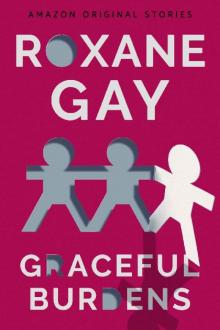 Graceful Burdens (Out of Line collection)
Graceful Burdens (Out of Line collection)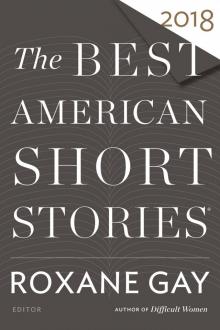 The Best American Short Stories 2018
The Best American Short Stories 2018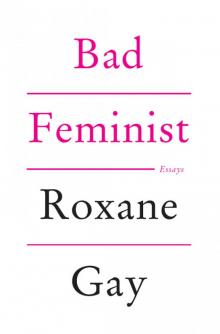 Bad Feminist
Bad Feminist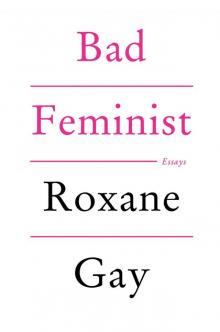 Bad Feminist: Essays
Bad Feminist: Essays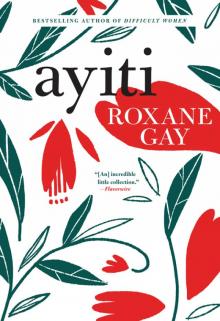 Ayiti
Ayiti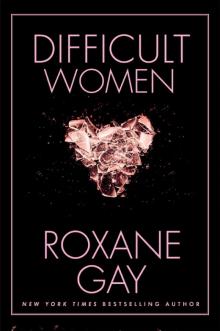 Difficult Women
Difficult Women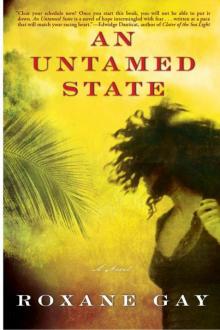 An Untamed State
An Untamed State Hunger
Hunger